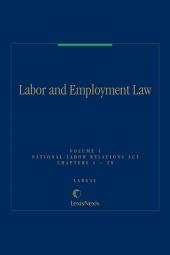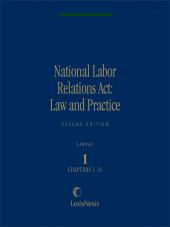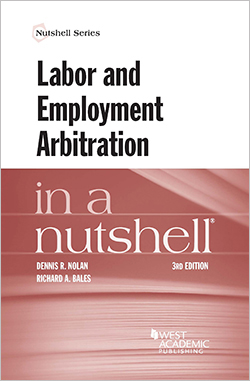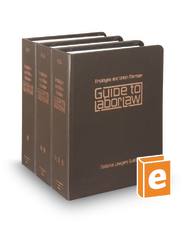Home
Getting Started
Labor vs. Employment Law?
Labor law and employment law are related but the terms should not be used interchangeably. Labor law in the United States typically focuses on unions and collective bargaining between unions and employers. By contrast, employment law governs the employment relationship between individual employees and their employer. The two areas of law are closely related but are often distinct areas of legal practice.
This guide will focus on the laws that govern collective bargaining and labor relations in both the private and public sectors and research resources you may find useful. A separate research guide on employment law is in the works.
Key Legislation
Federal Legislation - Private Sector
-
Railway Labor ActMay 20, 1926, ch. 347, 44 Stat. 577 (1926); 45 U.S.C. §§151-188
Regulates the labor-management relations of railroads and airlines. Created the National Mediation Board and the National Railroad Adjustment Board. -
Norris-La Guardia Act (a/k/a the Anti-Injunction Bill)The Act of March 23, 1932 (Ch. 90, 47 Stat. 70); 29 U.S.C. §§101-115
Established the right of employees to form unions without employer interference, prevented federal courts from issuing injunctions in nonviolent labor disputes, and made "yellow-dog contracts" (where employees agree to not join a labor union as a condition of employment) unenforceable in federal court. -
National Labor Relations Act (a/k/a Wagner Act)Pub. L. No. 74-198, 49 Stat. 449 (1935); 29 U.S.C. §§151-169
Guaranteed the right of private sector employees to organize, form union, and bargain collectively with their employers. Created the National Labor Relations Board. -
Labor Management Relations Act (a/k/a Taft-Hartley Act)Pub. L. No. 80-101, 61 Stat. 136 (1947); 29 U.S.C. §§141-187
Amended the National Labor Relations Act by adding a list of unfair labor practices (by unions) and other requirements and restrictions imposed mainly on unions. -
Labor-Management Reporting and Disclosure Act (a/k/a Landrum-Griffin Act)Pub. L. No. 86-257, 73 Stat. 519 (1959); 29 U.S.C. §§401-531
Regulates the relationship between a labor organization and its members and imposes certain reporting requirements and fiduciary obligations on labor organizations and their officers. The Department of Labor has exclusive enforcement authority for certain provisions of this statute relating to reporting requirements, trusteeships, and elections. Other provisions of this statute may be enforced by individual union members in federal district court.
Federal Legislation - Public Sector
-
Federal Service Labor-Management Relations Statute (a/k/a The Civil Service Reform Act of 1978 or simply, The Statute)Pub.L. No. 95–454, 92 Stat. 1111 (1978); 5 U.S.C. §§7101-7135
Law establishing collective bargaining rights for federal employees. (Title VII of the Civil Service Reform Act of 1978.) Abolished the U.S. Civil Service Commission and created the Office of Personnel Management, the Merit Systems Protection Board, and the Federal Labor Relations Authority.
Federal Legislative History
-
U.S. Federal Legislative History Library (HeinOnline)Background on the above federal statutes can be found in the collections made available by HeinOnline. The statutes may be searched by Publication Title, Public Law Number, or by the Popular Name of the statute.
State Legislation - Public Sector
-
American Federation of State, County, and Municipal Employees (AFSCME)A collection of links to state public sector collective bargaining laws.
Government Agencies
National Labor Relations Board (NLRB)
The National Labor Relations Board (NLRB) is the federal agency charged with the administration and enforcement of the National Labor Relations Act. Consists of two branches: the General Counsel and the National Labor Relations Board. The General Counsel is granted investigative and prosecutorial authority and issues guidance to NLRB staff in the form of memoranda. The 5-person National Labor Relations Board is an adjudicative tribunal that interprets the statute and issues decisions that may be appealed to the US Circuit Courts of Appeal.
-
Regulations (29 C.F.R. § 100.101-103.100)Found in Title 29 Subtitle B Chapter I of the Code of Federal Regulations.
-
NLRB Decisions and OrdersThe NLRB acts primarily through its decisions and orders, where it either agrees or disagrees with an earlier administrative law judge's ruling on the matter. An NLRB decision may then be appealed directly to the U.S. Circuit Courts of Appeal (as opposed to being appealed at the district court level of the federal courts).
National Mediation Board (NMB)
The National Mediation Board (NMB) is a federal agency designed to facilitate labor-management relations in the nation's railroad and airline industries. Specifically, the NMB regulates the procedures for evaluating requests by employee groups for union representation, acts as a mediator in disputes regarding the terms and conditions of employment, and interprets contract language it helped finalize. Matters in which the NMB has exclusive jurisdiction are subject to very limited review by federal courts.
-
Regulations (29 C.F.R. § 1200-1299)Found in Title 29 Subtitle B Chapter X of the Code of Federal Regulations.
National Railroad Adjustment Board
The National Railroad Adjustment Board (NRAB) is a standing arbitration board that hears and decides disputes regarding the application and interpretation of collective bargaining agreements. Matters in which the NRAB has exclusive jurisdiction are subject to very limited review by federal courts.
-
Regulations (29 C.F.R. § 301.1-301.9)Found in Title 29 Subtitle B Chapter III of the Code of Federal Regulations.
Federal Labor Relations Authority
The Federal Labor Relations Authority (FLRA) is an independent federal agency that governs labor relations between the federal government and its employees.
-
Regulations (5 C.F.R. § 2411.1-2473.1)Found in Title 5 Chapter XIV of the Code of Federal Regulations.
-
FLRA DecisionsIncludes FLRA Decisions, Administrative Law Judge Decisions, Solicitor's Briefs, archival decisions, and legislative history.
Office of Labor-Management Standards
Part of the Department of Labor, the Office of Labor-Management Standards (OLMS) administers and enforces most provisions of the Labor-Management Reporting and Disclosure Act of 1959. Maintains copies of financial and other reports filed by unions, union officers, employers, etc., as well as union constitutions, by-laws, and collective bargaining agreements. Be sure to also check the website of a particular union, as relevant documents may be posted there as well.
-
Regulations (29 C.F.R. § 400-499)Found in Title 29 Subtitle B Chapters II and IV of the Code of Federal Regulations.
-
Agency Determinations/DecisionsIncludes Election Decisions, Trusteeship Decisions, and other types of decisions/determinations made by the OLMS.
-
Online Public Disclosure RoomIncludes union reports, collective bargaining agreements, and other documentation.
State Labor Agencies
-
Association of Labor Relations Agencies (ALRA)Links to U.S. state labor relations and mediation agencies and boards.
Judicial/Administrative Decisions
Agency Websites
Agency websites generally provide access to more recent agency decisions and determinations, though commercial legal research platforms may be easier to search. (See "Government Agencies," above, for more information and links to relevant agencies.)
Commercial Legal Research Platforms
-
Bloomberg LawClick on the "Browse" icon (upper left corner), then click on "Practice Centers" => "Labor & Employment." The "Opinions, Dockets, Arbitration Awards" module allows you to search All Court Opinions, Labor & Employment Court Opinions, Dockets, Labor Arbitration Awards, or NLRB Decisions and Orders. The "Agency Materials" module allows you to select a specific agency (e.g., Federal Labor Relations Authority) and search a variety of Orders & Decisions or Guidance & Interpretation.
-
Bloomberg Law/BNA's Labor PLUSBloomberg Law's Labor PLUS component (previously known as "BNA Labor PLUS") allows you to access an NLRB Elections database, Work Stoppages database, Unfair Labor Practice Charges database, Settlement Summaries database, Contract Expirations database, and a Collective Bargaining Agreements database. You can also find a Labor Arbitration Awards tracker and more.
-
Lexis AdvanceLabor Law cases and administrative rulings can be found in a variety of ways using Lexis Advanced. You can start in the Labor & Employment Law Practice Area and search "All Labor & Employment Law Cases," or "All Labor & Employment Law Administrative Materials" to find court cases, agency decisions, or arbitration awards relating to Labor Law.
Alternatively, you can click on the "Browse" tab at the top and then go to "Practice Centers" => "By Practice Area or Industry" => "Labor & Employment." Then click on "Administrative Regulations & Materials," select the relevant agency (e.g., National Labor Relations Board), and then the type of guidance (e.g., "All NLRB Materials" or "National Labor Relations Board Decisions"). -
WestlawLabor Law cases and administrative rulings can be found in a variety of ways using Westlaw. You can start in the Employment Practice Area and then click on "Cases," "Administrative Decisions & Guidance," or "Administrative Materials" (in the right-hand margin under "Resources"). Either select specific content—such as National Labor Relations Board—or do nothing and search "All Content") to find court cases, agency decisions, or arbitration awards relating to Labor Law. (Remember to click on "Advanced" to the right of the search bar for more search options.)
Alternatively, you can use West's Key Number System and search cases by topic. First, click on "Labor and Employment (Topic # 231H)," then scroll down to find Key Numbers for specific, relevant case topics (e.g., #'s k960-k2169 for "Labor Relations"). Be sure to click on the "+'s" to expand and see more sub-topics.
Treatises
Treatises
-
The Developing Labor Law: The Board, the Courts, and the National Labor Relations Act, edited by John E. Higgins, Jr., et al. (7th ed. 2017).
 Call Number: KF3369 .D48 2017 (also available via Bloomberg Law)
Call Number: KF3369 .D48 2017 (also available via Bloomberg Law)
Provides a thorough discussion of labor-management relations; known for its extensive footnotes. -
Labor and Employment Law, by N. Peter Lareau
 (Available via Lexis Advance.)
(Available via Lexis Advance.)
Described as the "definitive and complete guide to Labor and Employment Law." -
Labor Union Law and Regulation, edited by William W. Osborne, Jr. et al. (2nd ed. 2017)
 Call Number: KF3389 .L33 2017 (also available via Bloomberg Law)
Call Number: KF3389 .L33 2017 (also available via Bloomberg Law)
Covers the many laws and regulations that affect unions, union members, and other represented employees. Organized by subject rather than statute. -
National Labor Relations Act: Law and Practice, by N. Peter Lareau
 (Available via Lexis Advance)
(Available via Lexis Advance)
Authoritative treatise on the entire scope of the National Labor Relations Act and related statutes, as interpreted by the NLRB and courts. Also addresses related matters of practice and procedure. -
Labor-Management Relations: Strikes, Lockouts, and Boycotts, by Douglas E. Ray
 (Available via Westlaw)
(Available via Westlaw)
Covers major labor regulations, including the legal prerequisites of a strike, the distinction between strikes and unfair labor practices, and other related matters.
Study Aids & Practice Materials
Study Aids
-
Understanding Labor Law, by Douglas E. Ray (4th ed., 2014).
 Call Number: KF3369 .R388 2014
Call Number: KF3369 .R388 2014 -
Mastering Labor Law, by Paul M. Secunda (2014).
 Call Number: KF3319 .S434 2014
Call Number: KF3319 .S434 2014 -
Labor and Employment Arbitration in a Nutshell, by Dennis R. Nolan (3rd ed. 2017).Call Number: KF3425 .N645 2017
Practice Materials
-
Employee and Union Member Guide to Labor Law: A Manual for Attorneys Representing the Labor Movement, by the National Labor and Employment Committee of the National Lawyers Guild, edited by Elise Gautier and Henry WillisProvides labor's perspective on significant areas of labor law (available via Westlaw).
-
Elkouri & Elkouri: How Arbitration Works (8th ed. 2016)
 Call Number: KF3424 .E53 2016 (also available via Bloomberg Law)
Call Number: KF3424 .E53 2016 (also available via Bloomberg Law)
Considered by many to be the standard text on labor arbitration. -
Fairweather's Practice and Procedure in Labor Arbitration, edited by Ray J. Schoonhoven (4th ed. 1999)
 (Also available via Bloomberg Law.)
(Also available via Bloomberg Law.)
Covers all aspects of labor arbitration and described as a "landmark reference" for parties, representatives, and decision-makers. -
How to Take a Case Before the NLRB, edited by Brent Garren, et al. (9th ed. 2016)
 Call Number: KF3372 .M25 2016
Call Number: KF3372 .M25 2016
A key resource for NLRB practice; written for the practitioner with many types of sample forms. -
NLRB Casehandling ManualAvailable from NLRB.gov website In 3 Parts (PDF format).
Part 1 - Unfair Labor Practice Proceedings;
Part 2 - Representation Proceedings; and
Part 3 - Compliance Proceedings. -
NLRB FormsAvailable from NLRB.gov website (PDF format).
Includes Unfair Labor Practice (ULP) Case Forms, Representation (R) Case Forms, and others.
Current Awareness
Journals
-
ABA Journal of Labor and Employment Law(Available online to HLS community, also via Westlaw and Lexis Advance.)
Balanced discussions of current developments in labor and employment law, designed to meet the needs of attorneys, judges, administrators, and the public. -
Comparative Labor Law & Policy Journal (University of Pennsylvania Law School).(Available online to HLS community, also via Westlaw and Lexis Advance.)
Publishes articles in the field of comparative and transnational labor and employment law with an emphasis on emerging nations. -
Berkeley Journal of Employment & Labor Law(Available online to HLS community, also via Westlaw and Lexis Advance.)
Publishes articles addressing a range of labor and employment law issues of interest to both scholars and practitioners. -
Hofstra Labor & Employment Law Journal(Available online to HLS community, also via Westlaw and Lexis Advance.)
Publishes articles focusing on various aspects of labor and employment law for both practitioners and scholars. -
American University Labor & Employment Law Forum(Available online to HLS community, also via Westlaw and Lexis Advance.)
Designed as a neutral forum for students, scholars, practitioners, and organizations to explore the complex developments of law governing the workplace. -
Industrial Law Journal (Oxford University Press)(Available online to HLS community, also via Lexis Advance.)
UK journal, providing comment and analysis on a wide range of topics relating to employment and labor law.
News
-
BNA Daily Labor Report(Available online to HLS community, also via Bloomberg Law.)
-
BNA Labor Relations Week(Available online to HLS community, also via Bloomberg Law.)
Blogs
-
Onlabor.orgOnLabor is a blog devoted to workers, unions, and their politics, founded by Harvard Law School professors Benjamin Sachs and Jack Goldsmith.
Professional, Advocacy, & Research Organizations
Professional Associations
-
ABA Section on Labor and Employment LawThe Section's members represent all perspectives of labor and employment law (i.e., management, union, plaintiff, neutral and public) and strives for a balanced discussion of employment issues throughout the world.
-
Labor and Employment Relations Association (LERA)The Labor and Employment Relations Association (LERA) is where professionals interested in all aspects of labor and employment relations network to share ideas and learn about new developments, issues, and practices in the field.
Advocacy & Research Groups
-
AFL-CIO (American Federation of Labor and Congress of Industrial Organization)Website for the largest federation of unions in the U.S. (consisting of 56 national and international unions).
-
The Worker Institute (at Cornell University's ILR School)The Worker Institute engages in research and education on contemporary labor issues, to generate innovative thinking and solutions to problems related to work, economy and society.
-
United Association for Labor EducationThe United Association for Labor Education is an organization of labor educators launched at the start of the century to promote and encourage the development of labor and worker education, to make labor education accessible to all working people, and to promote collective bargaining and the right to organize.
-
Labor Research & Action NetworkThe Labor Research and Action Network (LRAN) connects academics and labor practitioners to build workplace and economic power for working people in the US.
Getting Help
Getting Help
Ask Us! Submit a question or search our knowledge base.
Chat with us! Chat with a librarian (HLS only)
Email: research@law.harvard.edu
Contact Historical & Special Collections at specialc@law.harvard.edu
Meet with Us Schedule an online consult with a Librarian
Hours Library Hours
Classes View Training Calendar

